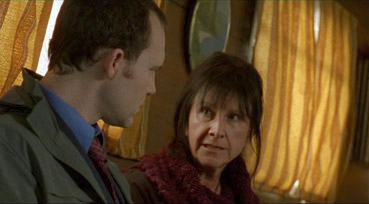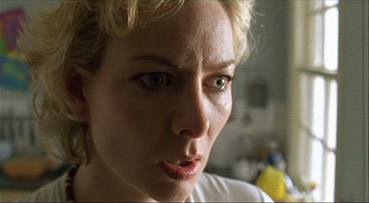|
If
you're like me, you probably have problems taking Voodoo
all that seriously, at least as it's usually presented on film. Tribal
drumming, orgiastic dancing, ritual sacrifice, pins stuck
into dolls to induce sudden heart attacks... it's all become
the stuff of dated horror cliché. And to a modern
liberal audience there's the whole issue of usually white
victims of African sorcery, which itself feels like a throwback
to less enlightened times, something else from the dark
continent for whitey to be scared of. Adding to this
is the recent demystification of the nature of the Voodoo religion,
which is apparently nothing like the sinister magic that
movies would have us believe.
So by making Voodoo not only central to the plot but having
the gall to announce this in the title, first time feature
director Robert Pratten is taking a bit of a chance, suggesting
a stylistic trip back to the heyday of Hammer, when an audience
could be expected to be nervous of anything that was strange
and foreign in origin.
Voodoo
can still be cinematically scary – both Angel Heart
and The Serpent and the Rainbow very effectively
suggested that to mess with such forces is to invite serious
consequences. In both of these films, as with most others
in western cinema, Voodoo remained locked to a specific
locale, and the hapless protagonists would have generally
been fine if they had just stayed at home and not poked
their noses into the business of others. London
Voodoo differs in that it locates
the magic in a modern urban setting, much as Rosemary's
Baby and The Exorcist so memorably
did with Devil worship and demonic possession. There, I
should point out, the similarities largely end.

It all kicks off when American businessman Lincoln Mathers,
his wife Sarah and their baby daughter Beth arrive at their
newly procured South London house. While Lincoln is wrapped
up in his new position at a Canary Wharf firm, Sarah gets
to work on the cellar, and the first thing she uncovers
is a ritualistic grave containing two long-dead bodies.
And it's here that we run into London Voodoo's equivalent of
Evil Dead's inquisitive night-time walk in the woods,
a plot development that only the most forgiving are going
to buy into. Sarah tells hubby about the find and he is understandably
shocked. Should they get the police? Sarah says no and pleads
to be allowed to explore the find in her own way. This is
fair enough – the opening of the grave clearly released
something that has affected and perhaps even taken control
of her brain, so she's acting out of distorted and unknowing self-interest.
But after just a little bit of pestering, Lincoln agrees.
A visitor in a foreign land finds two bodies in his cellar
and after a couple of pleads from his wife he agrees that
there's no need to inform the authorities, and he doesn't
let the presence of the corpses disturb his sleep or distract
him from his business deals. Sorry, but that's a big bloody
pill to swallow.
But
for the sake of argument and narrative progression, we'll
nip past that one. Whatever it was that came out of the
grave and into Sarah starts popping up to take control of
her with increasing regularity, something that doesn't go
unnoticed by those around her. Strong echoes of The
Omen deliver a suspicious-seeming nanny (a heavily
telegraphed and crimson coloured herring) and a holy man barking
out warnings to the bemused Lincoln, an encounter more likely
to prompt giggles than shivers. That Lincoln doesn't take
him seriously is not surprising, but like Ambassador Thorn
before him, events will eventually prompt him to change
his tune and turn to the religiously inclined for help.
London
Voodoo is a debut feature made on a low budget, and
you'd have little trouble guessing this if I hadn't just told
you. The plot lacks complexity or any real surprises, and
we are into the action before there is any serious character engagement. Self-absorbed husband Lincoln never becomes
interesting enough to care much about, and of the supporting
cast, only Trish Mortimer as white Voodoo follower Fiona
invests her character with the sort of quiet conviction
needed to sell the central concept in a more cynical age.
The less said about the two builders hired to do up the
haunted cellar, the better.

The
saving grace here is Sara Stewart, who after a so-so start
as the happy American wife takes her role of increasingly
possessed Voodoo witch by the teeth and bites down hard. Her gradual
transformation into a demonic gothic sex-pot may follow
generic tradition, but it is in these scenes that the film
starts to really find its feet, from her distracted patterning
of a heart-shaped symbol (which bears an unfortunate similarity
to the Walls Ice Cream logo) and angry outbursts in Haitian
Creole, to a genuinely extraordinary moment when she bites
Lincoln on the nose, seemingly on furious impulse, then
spits the drawn blood into a small bottle that is instantly
secreted for who knows what purpose.
Whether
London Voodoo works as a whole is a matter
of opinion. The restrictive location and studio work does
develop a cumulatively claustrophobic feel, and Voodoo itself
is at least presented in a less lurid and racially singular
manner than is the cinematic norm. Had I been more involved
with the characters I may well have been more unsettled
by Sarah's transformation (though it still has its moments),
but I'd still have hoped for a little more plot than "She's
possessed, let's exorcise her." There seems little
doubt, though, that with the right material and actors,
director Pratten could produce a genre work of some note,
and occasionally here, as in the oddly effective scene in
which Fiona returns to her houseboat, eerily scored by Souxisie
and the Banshees guitarist Steve Severin, there are signs
of the stranger, creepier film he may yet make.
Given
that the film was shot on 16mm and blown up to 35mm, the
image here is surprisingly crisp and detailed – in the accompanying
documentary, director Pratten states that after doing a
blow-up test they were sold on the idea of shooting on 16mm
because it looked as good as 35mm. There may be noticeably
more grain than on the better 35mm stocks, but otherwise
I'd have to agree, at least on the evidence here. Colour
and contrast are both very impressive, and the black levels
are solid. The framing 1.85:1 and the image is anamorphically enhanced.
Dolby
2.0 stereo and 5.1 surround tracks are on offer, and for
punch and its more immersive nature, the 5.1 is definitely
the winner, especially for its reproduction of Severin's
score.
As
so often with low-budget independent works, the DVD release
is better featured than many of its big studio counterparts,
and there's not even a hint of the "special edition"
label that would be instantly slapped on the box if a mainstream
release had even half of the features included here.
Commentary
with Director Robert Pratten
As new to commentary tracks as he is to feature
directing, Pratten is sometimes a little hesitant, and several
of the more common ticks of filmmaker commentaries are intermittently
evident here – stating the obvious, describing what's happening
on screen, beginning sentences with "I love this..."
– but there is also some useful background on the cast and
the technical aspects of the production.
The
Voodoo Diaries (58:53)
Subtitled "Behind the Scenes – The Making of London
Voodoo," this is a rough and ready but interesting
mixture of video diary, interview and behind-the-scenes
footage that follows the making of the film from the first
script phone call through the pre-production and rehearsals
to the shoot itself. Although framed 16:9, a few of the
shots have clearly been filmed in 4:3 and then stretched to fill the
screen. There are brief shots in which storyboards have
been included and are strangely blurred out.
Interview
With a Voodoo Priest (18:49)
The too-perfectly named Ross Heaven provides a history and
outline of the Voodoo religion and its practices and particularly
the spiritual element. It demystifies what has been largely
sensationalised in the media, but will do little to convince
the sceptical.
Deleted
Scenes (14:03)
A number of cut scenes, which have been edited and scored.
Picture quality is not up to that of the feature, suggesting
they were transferred from slash prints or video masters.
It includes a brief "Thank You" montage of those
whose roles were lost in the final edit.
Trailer 1 (2:00) and Trailer 2
(1:32) do an OK job of selling the film (2 does it better).
Reel North: Premiere (4:57)
Extract from a TV programme covering the premiere of the
film at the AMC in Manchester. Includes interviews with
director Robert Pratten, actors Sara Stewart, Doug Cockell
and Vonda Barnes (who plays babysitter Kelly) and composer
Steve Severin.
There
are also trailers for other Nucleus releases Between
Your Legs, The Ugliest Woman in the World,
Gwendoline, Fausto 5.0
and Death Ship.
I
have to admit that London Voodoo didn't
really work for me, despite some effective moments, a pleasingly
low key approach and Sara Stewart's performance. But the
film definitely has its admirers, and I'd suggest that horror
devotees weary of the shouty, big budget approach of most
recent western studio attempts at the genre should give
it a look, as they may find themselves one of them. Certainly
Nucleus have done well by the DVD, which has a decent transfer
and a reasonable set of extras.
|